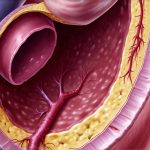Gastrointestinal tumors represent a significant global health challenge, encompassing a diverse range of cancers affecting the esophagus, stomach, intestines (small and large), rectum, and anus. These malignancies are often insidious in their early stages, making timely diagnosis difficult and impacting treatment outcomes. While lifestyle factors – diet, smoking, alcohol consumption, and physical activity – undeniably play crucial roles in cancer development, an increasing body of evidence highlights the substantial contribution of genetic predisposition to the risk of developing these tumors. Understanding the genetic landscape underlying gastrointestinal cancers is not merely about identifying those at higher risk; it’s also paving the way for more personalized prevention strategies, earlier detection methods, and targeted therapies that can dramatically improve patient survival rates.
The interplay between genetics and environment is complex. It’s rarely a simple case of inheriting a ‘cancer gene.’ More often, inherited genetic variations subtly increase susceptibility, meaning individuals with these variants are more likely to develop cancer if exposed to certain environmental triggers. Conversely, others may possess similar genetic predispositions yet never develop the disease due to protective lifestyle choices or other mitigating factors. This intricate relationship demands a nuanced understanding of both inherited and acquired genetic alterations that contribute to gastrointestinal tumorigenesis. Moreover, recent advancements in genomic technologies are revealing increasingly complex patterns of gene expression and regulation impacting cancer development beyond simple mutations.
Hereditary Gastrointestinal Cancer Syndromes
Hereditary cancer syndromes account for approximately 5-10% of all gastrointestinal cancers. These syndromes are characterized by a clear pattern of cancer occurring across generations within families, often at younger ages than typically observed in sporadic cases. Identifying these syndromes is vital not only for the affected individuals but also for their family members who may be carriers of the predisposing genes and could benefit from proactive screening and preventative measures. Several well-defined hereditary syndromes are strongly linked to increased risk of specific gastrointestinal tumors.
Familial Adenomatous Polyposis (FAP) is perhaps the most well-known, caused by mutations in the APC gene. Individuals with FAP develop hundreds to thousands of adenomatous polyps in the colon and rectum during their teens and twenties. Without intervention – typically surgical removal of the colon (prophylactic colectomy) – nearly 100% will develop colorectal cancer. Another significant syndrome is Lynch Syndrome, also known as Hereditary Non-Polyposis Colorectal Cancer (HNPCC), arising from mutations in mismatch repair genes (MLH1, MSH2, MSH6, and PMS2). Lynch Syndrome increases the risk of not just colorectal cancer but also endometrial, ovarian, stomach, and other cancers. Finally, Peutz-Jeghers syndrome, caused by mutations in the STK11 gene, is characterized by hamartomatous polyps throughout the gastrointestinal tract, increasing the risk of cancers of the small intestine, pancreas, lung and breast.
These syndromes are generally identified through genetic testing, often prompted by a family history suggestive of hereditary cancer predisposition. Genetic counseling plays a critical role in helping individuals understand their risks, interpret test results, and make informed decisions about screening, prevention, and potential treatment options. Early identification is key to maximizing the effectiveness of preventative strategies and improving long-term outcomes. The ongoing development of more accessible and affordable genetic testing continues to improve diagnosis rates for these syndromes.
Sporadic Genetic Alterations in Gastrointestinal Tumors
While hereditary syndromes explain a proportion of gastrointestinal cancers, the vast majority occur sporadically – meaning they arise from acquired genetic alterations that accumulate over an individual’s lifetime rather than being inherited. These alterations typically involve mutations in genes controlling cell growth, differentiation, and apoptosis (programmed cell death). These mutations are not present at birth but develop due to environmental exposures or random errors during DNA replication.
The molecular mechanisms driving sporadic gastrointestinal tumorigenesis are complex and vary depending on the specific tumor type and location within the GI tract. For example, in colorectal cancer, a well-established sequence of genetic events – known as the “adenoma-carcinoma” sequence – is often observed. This typically begins with mutations inactivating the APC gene, leading to polyp formation. Subsequent mutations then activate oncogenes like KRAS and MYC, promoting uncontrolled cell growth. Finally, loss of function mutations in tumor suppressor genes such as TP53 drive progression to invasive carcinoma. Similar but distinct genetic landscapes are found in gastric cancer, esophageal adenocarcinoma, and pancreatic cancer, each involving different sets of driver mutations.
Advances in genomic sequencing technologies – including whole-genome sequencing and exome sequencing – have allowed researchers to identify hundreds of somatic (acquired) mutations within gastrointestinal tumors. However, not all mutations contribute equally to cancer development. Identifying the driver mutations – those that directly promote tumorigenesis – remains a major challenge but is crucial for developing targeted therapies. Furthermore, epigenetic alterations—changes in gene expression without altering the underlying DNA sequence—are increasingly recognized as important contributors to sporadic gastrointestinal cancers.
The Role of TP53
The TP53 gene is often called the “guardian of the genome” due to its critical role in maintaining genomic stability. It functions as a tumor suppressor, preventing cells with damaged DNA from replicating. Mutations in TP53 are among the most common genetic alterations found across virtually all types of cancer, including gastrointestinal tumors. In fact, TP53 mutations often represent a late event in tumorigenesis, driving progression from early stages to more aggressive disease.
Loss of TP53 function leads to an accumulation of further mutations and genomic instability, accelerating tumor growth and promoting metastasis. Individuals with Li-Fraumeni syndrome inherit germline mutations in TP53, predisposing them to a wide range of cancers at young ages. Even in sporadic cases, TP53 mutations are often associated with poorer prognosis and resistance to chemotherapy. Research efforts are focused on restoring TP53 function or targeting downstream pathways affected by its loss as potential therapeutic strategies.
KRAS and BRAF Mutations
KRAS and BRAF are oncogenes that encode proteins involved in cell signaling pathways regulating growth, differentiation, and survival. Mutations in these genes – particularly activating mutations – are frequently found in colorectal cancer and pancreatic cancer. These mutations lead to constitutive activation of the downstream signaling cascade, promoting uncontrolled cell proliferation.
Approximately 30-40% of colorectal cancers harbor KRAS mutations, making it a valuable biomarker for predicting response to anti-EGFR therapy. Patients with KRAS-mutated tumors generally do not respond well to these agents, as the signaling pathway remains active despite EGFR inhibition. Similarly, BRAF mutations are found in about 5-10% of colorectal cancers and are associated with a more aggressive disease course and resistance to certain therapies. Identifying these mutations through routine testing guides treatment decisions and helps personalize cancer care.
Microsatellite Instability (MSI) and Mismatch Repair Deficiency (dMMR)
Microsatellite instability (MSI) is a hallmark of Lynch Syndrome but also occurs sporadically in many gastrointestinal cancers, particularly colorectal cancer. MSI refers to changes in the length of repetitive DNA sequences called microsatellites, caused by defects in DNA mismatch repair (dMMR). As mentioned previously, dMMR often results from mutations in MLH1, MSH2, MSH6, or PMS2 genes.
Tumors with MSI-High (MSI-H) or dMMR exhibit a high mutation burden and generate neoantigens—novel proteins recognized by the immune system. This makes them particularly responsive to immunotherapy, specifically checkpoint inhibitors like pembrolizumab. Routine screening for MSI/dMMR is now standard practice in many colorectal cancer treatment protocols, allowing clinicians to identify patients who are likely to benefit from immunotherapy. The identification of MSI-H tumors has significantly expanded the use of immunotherapy as a treatment option for gastrointestinal cancers.


















